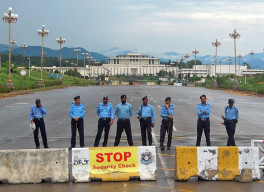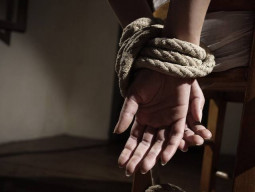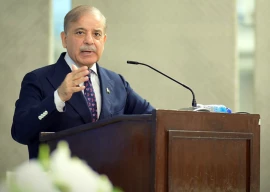
The protests, held over the past 12 days, have strangled economic life in the capital. By the trade and industry minister’s estimates, the country has lost an estimated $310 million each day since January 25. But signs of life are beginning to appear. Banks will open for limited hours on Sunday and many citizens will return to work despite military presence. The curfew has also been shortened from 7:00 pm until 6:00 am.
But now the debate of President Hosni Mubarak’s status has expanded to include more than just those in Tahrir Square versus the government to the voices of other citizens, whose lives have been disrupted by the turmoil over the last week and a half. “I just want to live my life normally now and I’d like things to get resolved as soon as possible,” said May Ahmed, a Cairo resident. Money and food shortages have also become a concern for many citizens.
State-run television continues to play patriotic songs and airs commercials urging stability and security. Some civilians also continue to hold neighborhood watch committees and checkpoints to be sure their communities are protected.
Defiant protesters remained in Tahrir Square and tried to keep military tanks from entering the square, while ignoring requests that protesters remove the blockades they had built to protect themselves from the pro-Mubarak protesters and leave the square. As reported by Reuters, General Hassan Al Roweni told protesters, “You all have the right to express yourselves but please save what is left of Egypt. Look around you,” but the protesters refused, chanting that they will not leave – Mubarak will leave.”
So far, the day has been marked by peaceful demonstrations and although there are fewer protesters on Saturday, some protesters indicate that they have no intention to move. “I came here on Tuesday [the 25th of January]; then I came back on Friday and have been coming to Tahrir Square every day since. I will not leave until Mubarak steps down,” said one protester, who asked to remain anonymous.
On the political front, while President Hosni Mubarak has not indicated that he is going to leave the presidency just yet, Safwat El Sherif, the ruling National Democratic Party’s secretary general and Gamal Mubarak, son of President Mubarak, assistant general, and head of the party’s policies committee, have both resigned to be replaced by Hossam Badrawi, an NDP and a parliamentary member. The remaining three members of the NDP’s steering committee under the secretary general have also resigned. The resignations come as a step to further try to placate the opposition and offer concessions, while several former ministers, including ex-minister of interior, Habib Al Adly, remain under house arrest.
On the other hand, Vice President Omar Suleiman met with opposition leaders once again, including protester representatives, known as the “January 25th Youth,” to discuss the reforms and try to reach a compromise. There are also reports that the vice president and the opposition will try to isolate Mubarak from the forefront in the near future in an effort to ease the political transition.
In a separate development, a gas pipe which carries gas from Egypt to Jordan, Syria, and Israel, exploded in northern Sinai on Friday. No one was hurt and the explosion was supposedly caused by a leak in the gas pipe.
Published in The Express Tribune, February 6th, 2011.



1731975305-0/Untitled-design-(40)1731975305-0-165x106.webp)
1731975060-0/Untitled-design-(39)1731975060-0-165x106.webp)





1731929357-0/Express-Tribune-(6)1731929357-0-270x192.webp)






COMMENTS (1)
Comments are moderated and generally will be posted if they are on-topic and not abusive.
For more information, please see our Comments FAQ